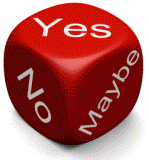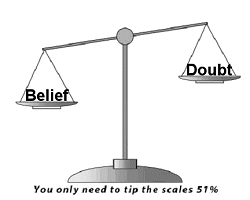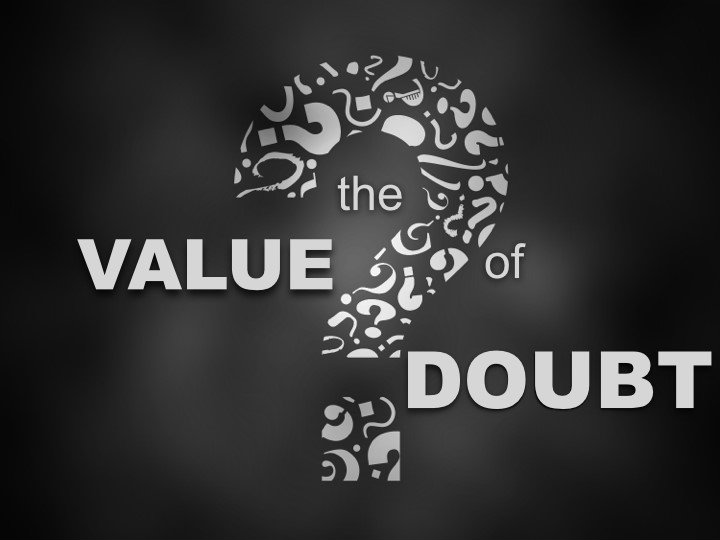 We all have beliefs—things we just know are true. Recently, I’ve been exploring my beliefs about doubt. Like me, you might strongly believe that it’s important to banish doubt in order to act decisively and achieve your objectives. But what if we’re…no, we couldn’t be…but what if…
We all have beliefs—things we just know are true. Recently, I’ve been exploring my beliefs about doubt. Like me, you might strongly believe that it’s important to banish doubt in order to act decisively and achieve your objectives. But what if we’re…no, we couldn’t be…but what if…
Consider a scale from belief to doubt to disbelief.
Believe it is true —————–Doubt (don’t know)——————Believe it is false
When I absolutely believe something, I’m at one far end of the scale. When I totally don’t believe something, I’m at the other end (totally believing something is false I see as just as much a belief as believing it’s true). When I permit myself to neither believe nor disbelieve, I have doubt…and I place doubt in the middle of this scale.
Strong belief is at the core of our values, rules of life, religion, and/or spirituality. It is what guides us through hard times to success. World series have been won on the one-word mantra “believe”! Belief can keep us on a track.
If I consider a thing to be “true,” I have a tendency to fall toward the “belief” end of the scale. If I don’t know or feel uncomfortable or unclear about the thing, then I fall more toward “doubt” in the center. If I consider the thing to be absolutely false, then I’m over on the “disbelief” end (which is actually a belief, right?), and I can be clear there as well.
The continuum is a measure of our judgment. And judging is the primary function of our Knower/Judger. The firmer our belief is, the more we see our judgment being true. Our knowledge lives at the outer edges of this scale. We just know.
There’s no room for doubt!
Doubt is frequently touted as the enemy of success. Being decisive seems to be rewarded in our culture. In order to act decisively, I have to strongly believe that what I decide is “right” (gives me what I want). Doubt, at this juncture, would probably make me hesitate. I would not be decisive, strong, and assertive.
Doubt is frequently pictured as a little black cloud hanging over someone’s head. It’s seen as producing a catatonia where one doesn’t seem able to act. In mass quantities, doubt can be paralyzing and depressing.
Once I’m settled on a belief, it’s easier to execute. I don’t have to think about actions backed by my beliefs. I just do them. And doing them makes me feel good because I acted in accordance with my beliefs.
My beliefs are all founded on decisions I made sometime in the past. I looked at the data, and was most likely influenced by others (parents, teachers, ministers, coaches, acquaintances, some people with my best interests at heart, some not). Once engraved in my little rulebook of life, my “belief” became cast in stone.
One such belief of mine has been that doubt is bad. Always negative. Unproductive. To be avoided. (Kind of a self-preservation belief from belief’s point of view, isn’t it?)
But what if my belief is, gasp, wrong! It’s probably not…don’t worry. I’ve been right all my life. Except when my belief was based on some terrible misunderstanding or just simply bad information. (And that error in my interpretation of the data on which I based the belief could be huge, or it could be miniscule.)
These are hard facts. Or are they?
Let me pick on science for a minute. When I was growing up in the 1950s, science told me (so it became a belief of mine) that the smallest particle was the atom. Also that Pluto was a planet, and Einstein’s theory of relativity either already did or would soon explain the whole universe. These were foundations of my scientific beliefs. They’re all now proved or being proved inaccurate (well, with the possible exception of Pluto’s status….they’re coming back around to thinking it’s a planet). It seems that science is continually correcting itself and has been for thousands of years, getting closer and closer to reality.
The problem is that science takes a “fact” and leverages it to get to the next step in knowledge acquisition. Then somebody comes along and disproves the foundational fact, thus invalidating a few centuries of conclusions. Arrrghhh!!!
So every once in a while, I like to take stock of the “facts” I have trust in. I have a tendency to take them for granted. They include such things as my excellent ability as a rally navigator and my terrible ability as a golfer. Both “facts” are in my belief system. My facts contain “rights” and “wrongs,” such as freedom and racism. They contain “good” and “bad,” like certainty and doubt.
Then I like to blow them up and ask ,“What if my facts are not accurate? What does that mean to my world?” For all intents and purposes, I willfully doubt a truth of mine…just to test it out. And almost every time I return from that conversation, my “fact”—my “truth”—has shifted.
Doubt, it seems, lets me see things from a different perspective. Unless I intentionally go there, I don’t stand much of a chance of accidentally getting closer to reality. You can tell me I’m wrong and I’ll just entrench and defend. When I suggest to myself that I might not have it right, I’m expanding my universe.
By doubting my knowledge of doubt (that it’s bad, little black cloud, etc.), and freeing myself to explore, I can continuously fine-tune my perception of my world and develop increased clarity.
Maybe that’s why it’s termed “the benefit of the doubt.”


